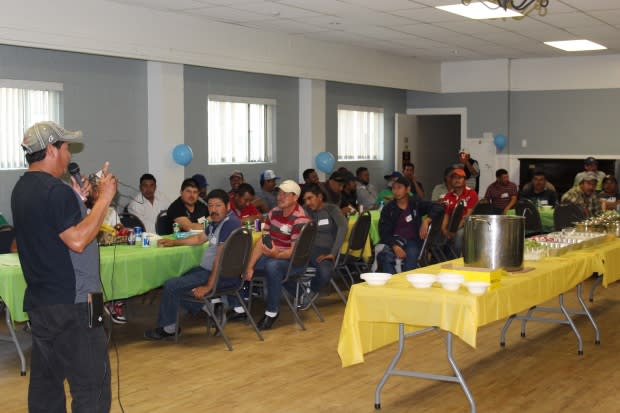Away from their kids, foreign workers in the Lower Mainland celebrate Father's Day
Victor Serrano has three children, but this weekend he's spending Father's Day with a few friends to ease the pain of being far from home.
Serrano is a temporary foreign worker from Mexico, currently working in a factory in the Fraser Valley. Since he came to Canada in 2007, he only sees his kids, age 13, 17 and 20, twice a year when he flies back between jobs to see them.
"It's hard. But, you know, we have to do it that way. That's the only way that we can support our families back home," Serrano said over the phone.
On Saturday night, Serrano was one of about 200 temporary foreign workers who gathered at a Masonic Hall in Langley, B.C., for a Father's Day gathering.

The event was organized by the Migrant Workers Dignity Association, a volunteer-run organization that supports migrant workers — most of them farm workers from Latin America. This year is the tenth time it has organized a Father's Day event.
The organization says many of the workers — in Canada as part of the country's Temporary Foreign Worker Program created to ease short-term labour shortages — face unfair working conditions.
Serrano says many of the workers don't speak English or know Canadian laws, so it's easy for employers to take advantage of them. He says unpaid overtime, crowded living conditions and low wages are some of the most common issues they face.
Loneliness and isolation
Natalia Sudeyko, a volunteer counsellor and assistant with the association, says another major issue for the workers is loneliness.
Sudeyko says many of the migrants work in remote areas with little access to public transit or the Internet. And language barriers make it hard for them to connect with other people in their workplace.
But the hardest part for most of the workers, many of them married with children, is being away from the families they're here to support — sending their wages home so their kids can go to school.
"They're playing a really important role for their families. But in order to do that, unfortunately they miss a lot of important events in their children's lives," she said.
Sharing stories
Sudeyko and Serrano say events like the one on Saturday night help the workers connect and commiserate about their situations.
"This is the only chance that we can get so we can get together and we can share stories, experiences, and we can have some kind of fun," Serrano said.
Other than the food, music and other festivities, the events also serves to provide migrant workers with information about their rights and to connect them with services and benefits.
The association also organizes other events throughout the year. The next one will be a health fair in the fall.

